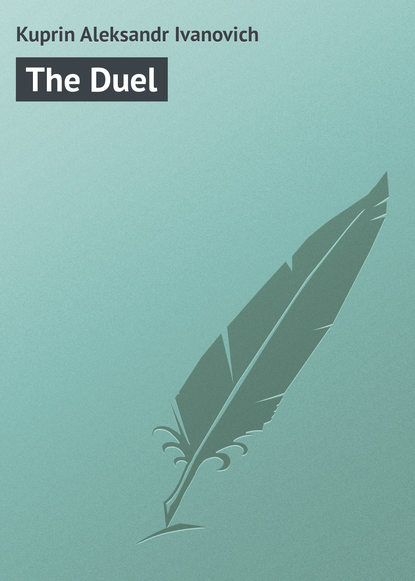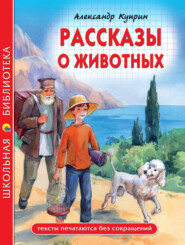По всем вопросам обращайтесь на: info@litportal.ru
(©) 2003-2024.
✖
The Duel
Настройки чтения
Размер шрифта
Высота строк
Поля
“Well, gentlemen, there was at that time a certain ensign – Solúcha,” said Liech, making one more attempt.
Captain Osadchi, commander of the 1st Company, approached from the buffet.
“I hear that you are talking about duels – most interesting,” he began in a gruff, rolling bass that reminded one of a lion’s roar, and immediately drowned every murmur in the room. “I have the honour, Lieutenant-Colonel. Good-evening, gentlemen.”
“Ah! what do I see – the Colossus of Rhodes? Come and sit down,” replied Liech affably. “Come and have a glass with me, you prince of giants.”
“All right,” answered Osadchi in an octave lower.
This officer always had a curiously unnerving effect on Romashov, and at the same time aroused in him a mingled feeling of fear and curiosity. Osadchi was no less famous than Shulgovich, not only in the regiment but also in the whole division, for his deafening voice when giving the word of command, his gigantic build, and tremendous physical strength. He was also renowned for his remarkable knowledge of the service and its requirements. Now and then it even happened that Osadchi was, in the interests of the service, removed from his own regiment to another, and he usually succeeded, in the course of half a year, in turning the most backward, good-for-nothing troops into exemplary war-machines. His magic power seemed much more incomprehensible to his brother officers inasmuch as he never – or at least in very rare instances – had recourse to blows or insults. Romashov always thought he could perceive, behind those handsome, gloomy, set features, the extreme paleness of which was thrown into stronger relief by the bluish-black hair, something strained, masterly, alluring, and cruel – a gigantic, bloodthirsty wild beast. Often whilst observing Osadchi unseen from a distance, Romashov would try to imagine what the man would be like if he were in a rage, and, at the very thought of it, his limbs froze with fear. And now, without a thought of protesting, he saw how Osadchi, with the careless calm that enormous physical strength always lends, coolly sat down on the seat intended for himself.
Osadchi drained his glass, nibbled a crisp radish, and said in a tone of indifference —
“Well, what is the verdict?”
“That story, my dear friend,” Liech put in, “I will tell you at once. It was at the time when I was serving in the Temriukski Regiment, a Lieutenant von Zoon – the soldiers called him ‘Pod-Zvoon’ – who, on a certain occasion, happened to be at mess – ”
Here, however, Liech was interrupted by Lipski, a red-faced, thick-set staff captain who, in spite of his good forty years, did not think it beneath him to be the Jack-pudding in ordinary and butt of the men, and by virtue thereof had assumed the insolent, jocular tone of a spoilt favourite.
“Allow me, Captain, to put the matter in a nutshell. Lieutenant Artschakovski says that duels are nothing but madness and folly. For such heresy he ought to be sent with a bursary to a seminary for priests – but enough of that. But to get on with the story, Lieutenant Bobetinski took up the debate and demanded blood. Then came Lieutenant-Colonel Liech with his hoary chestnuts, which, on that occasion, by a wonderful dispensation of Providence, we managed to escape. After that, Sub-lieutenant Michin tried, in the midst of the general noise, to expound his views, which were more and more undistinguishable both from the speaker’s insufficient strength of lungs and his well-known bashfulness.”
Sub-lieutenant Michin – an undersized youth with sunken chest, dark, pock-marked, freckled face and two timid, almost frightened eyes – blushed till the tears came into his eyes.
“Gentlemen, I only – gentlemen, I may be mistaken,” he said, “but, in my opinion – I mean in other words, as I look at the matter, every particular case ought necessarily to be considered by itself.” He now began to bow and stammer worse and worse, at the same time grabbing nervously with the tips of his fingers at his invisible moustaches. “A duel may occasionally be useful, even necessary, nobody can deny, and I suppose there is no one among us who will not approach the lists – when honour demands it. That is, as I have said, indisputable; but, gentlemen, sometimes the highest honour might also be found in – in holding out the hand of reconciliation. Well, of course, I cannot now say on what occasions this – ”
“Ugh! you wretched Ivanovich,” exclaimed Artschakovski, interrupting him in a rude and contemptuous tone, “don’t stand here mumbling. Go home to your dear mamma and the feeding-bottle.”
“Gentlemen, won’t you allow me to finish what I was going to say?”
But Osadchi with his powerful bass voice put a stop to the dispute. In a second there was silence in the room.
“Every duel, gentlemen, must, above all, end in death for at least one of the parties, otherwise it is absurd. Directly coddling or humanity, so-called, comes in, the whole thing is turned into a farce. ‘Fifteen paces distance and only one shot.’ How damnably pitiful! Such a deplorable event only happens in such tomfooleries as are called French duels, which one reads about, now and then, in our papers. They meet, each fires a bullet out of a toy pistol, and the thing is over. Then come the cursed newspaper hacks with their report on the duel, which invariably winds up thus: ‘The duel went off satisfactorily. Both adversaries exchanged shots without inflicting any injury on either party, and both displayed the greatest courage during the whole time. At the breakfast, after the champagne, both the former mortal enemies fell into each other’s arms, etc.’ A duel like that, gentlemen, is nothing but a scandal, and does nothing to raise the tone of our society.”
Several of the company tried to speak at once. Liech, in particular, made a last despairing attack on those present to finish his story:
“Well, well, my friends, it was like this – but listen, you puppies.”
Nobody, however, did listen to his adjurations, and his supplicating glances wandered in vain over the gathering, seeking for a deliverer and ally. All turned disrespectfully away, eagerly engrossed in that interesting subject, and Liech shook his head sorrowfully. At last he caught sight of Romashov. The young officer had the same miserable experience as his comrades with regard to the old Lieutenant-Colonel’s talents as a story-teller, but his heart grew soft, and he determined to sacrifice himself. Liech dragged his prey away with him to the table.
“This – well – come and listen to me, Ensign. Ah, sit here and drink a glass with me. All the others are mere asses and loons.” Liech, with considerable difficulty, raised his languid arm and made a contemptuous gesture towards the group of officers. “Buzz, buzz, buzz! What understanding or experience is there amongst such things? But wait a bit, you shall hear.”
Glass in one hand, the other waving in the air as if he were the conductor of a big orchestra, Liech began one of his interminable stories with which he was larded – like sausages with liver – and which he never brought to a conclusion because of an endless number of divagations from the subject, parentheses, embroideries, and analogues. The anecdote in question was about an American duel, Heaven only knows how many years ago, between two officers who, playing for their lives, guessed odd and even on the last figure of a date on a rouble-note. But one of them – it was never quite cleared up as to whether it was a certain Pod-Zvoon or his friend Solúcha – was blackguard enough to paste together two rouble-notes of different dates of issue, whereby the front had always an even date, but the back an odd one – “or perhaps it was the other way about,” pondered Liech long and conscientiously. “You see, my dear fellow, they of course then began to dispute. One of them said – ”
Alas, however, Liech did not even this time get to the end of his story. Madame Raisa Alexandrovna Peterson had glided into the buffet. Standing at the door, but not entering, which was, moreover, not permitted to ladies, she shouted with the roguishness and audacity of a privileged young lady:
“Gentlemen, what do I see? The ladies have arrived long ago, and here you are sitting and having a good old time. We want to dance.”
Two or three young officers arose to go into the ballroom. The rest coolly remained sitting where they were, chatting, drinking, and smoking, without taking the slightest notice of the coquettish lady. Only Liech, the chivalrous old professional flirt, strutted up with bandy, uncertain legs to Raisa, with hands crossed over his chest – and pouring the contents of his glass over his uniform, cried with a drunken emotion:
“Most divine among women, how can any one forget his duties to a queen of beauty? Your hand, my charmer; just one kiss – ”
“Yuri Alexievich,” Raisa babbled, “it’s your turn to-day to arrange the dancing. You are a nice one to do that.”
“Mille pardons, madame. C’est ma faute. This is my fault,” cried Bobetinski, as he flew off to her. On the way he improvised a sort of ballet with scrapes, bounds, genuflections, and a lot of wonderful attitudes and gestures. “Your hand. Votre main, madame. Gentlemen, to the ballroom, to the ballroom!”
He offered his arm to Raisa Alexandrovna, and walked out of the room as proud as a peacock. Directly afterwards he was heard shouting in his well-known, affected tone:
“Messieurs, take partners for a waltz. Band! a waltz!”
“Excuse me, Colonel, I am obliged to go now. Duty calls me,” said Romashov.
“Ah, my dear fellow,” replied Liech, as his head drooped with a dejected look – “are you, too, such a coxcomb as the others? But wait just a moment, Ensign; have you heard the story of Moltke – about the great Field-Marshal Moltke, the strategist?”
“Colonel, on my honour, I must really go – I – ”
“Well, well, don’t get excited. I won’t be long. You see, it was like this: the great Man of Silence used to take his meals in the officers’ mess, and every day he laid in front of him on the table a purse full of gold with the intention of bestowing it on the first officer from whose lips he heard a single intelligent word. Well, at last, you know, the old man died after having borne with this world for ninety years, but – you see – the purse had always been in safe keeping. Now run along, my boy. Go and hop about like a sparrow.”
IX
IN the ballroom, the walls of which seemed to vibrate in the same rhythm as the deafening music, two couples were dancing. Bobetinski, whose elbows flapped like a pair of wings, pirouetted with short, quick steps around his partner, Madame Taliman, who was dancing with the stately composure of a stone monument. The gigantic Artschakovski of the fair locks made the youngest of the Lykatschev girls, a little thing with rosy cheeks, rotate round him, whereas he, leaning forward, and closely observing his partner’s hair and shoulders, moved his legs as if he were dancing with a child. Fifteen ladies lined the walls quite deserted, and trying to look as if they did not mind it. As, which was always the case at these soirées, the gentlemen numbered less than a quarter of the ladies, the prospect of a lively and enjoyable evening was not particularly promising.
Raisa Alexandrovna, who had just opened the ball, and was, therefore, the object of the other ladies’ envy, was now dancing with the slender, ceremonious Olisár. He held one of her hands as if it had been fixed to his left side. She supported her chin in a languishing way against her other hand, which rested on his right shoulder. She kept her head far thrown back in an affected and unnatural attitude. When the dance was over she sat purposely near Romashov, who was leaning against the doorpost of the ladies’ dressing-room. She fanned herself violently, and looking up to Olisár, who was leaning over her, lisped in a soft dolcissimo:
“Tell me, Count, tell me, please, why do I always feel so hot? Do tell me.”
Olisár made a slight bow, clicked his spurs, stroked his moustache several times.
“Dear lady, that is a question which I don’t think even Martin Sadek could answer.”
When Olisár cast a scrutinizing glance at the fair Raisa’s décolleté bosom, pitiable and bare as the desert itself, she began at once to breathe quickly and deeply.
“Ah, I have always an abnormally high temperature,” Raisa Alexandrovna went on to say with a significant expression, insinuating by her smile that her words had a double meaning. “I suffer, too, from an unusually fiery temperament.”
Olisár gave vent to a short, soft chuckle.
Romashov stood looking sideways at Raisa, thinking with disgust, “Oh, how loathsome she is.” And at the thought that he had once enjoyed her favours, he experienced the sensation as if he had not changed his linen for months.
“Well, well, Count, don’t laugh. Perhaps you do not know that my mother was a Greek?”
“And how horribly she speaks, too,” thought Romashov. “Curious that I never noticed this before. It sounds as if she had a chronic cold or a polypus in her nose – ‘by buther was a Greek.’”
Now Raisa turned to Romashov and threw him a challenging glance.
Romashov mentally said, “His face became impassive like a mask.”
“How do you do, Yuri Alexievich? Why don’t you come and speak to me?” Romashov went up to her. With a venomous glance from her small, sharp eyes she pressed his hand. The pupils of her eyes stood motionless.
“At your desire I have kept the third quadrille for you. I hope you have not forgotten that.”
Captain Osadchi, commander of the 1st Company, approached from the buffet.
“I hear that you are talking about duels – most interesting,” he began in a gruff, rolling bass that reminded one of a lion’s roar, and immediately drowned every murmur in the room. “I have the honour, Lieutenant-Colonel. Good-evening, gentlemen.”
“Ah! what do I see – the Colossus of Rhodes? Come and sit down,” replied Liech affably. “Come and have a glass with me, you prince of giants.”
“All right,” answered Osadchi in an octave lower.
This officer always had a curiously unnerving effect on Romashov, and at the same time aroused in him a mingled feeling of fear and curiosity. Osadchi was no less famous than Shulgovich, not only in the regiment but also in the whole division, for his deafening voice when giving the word of command, his gigantic build, and tremendous physical strength. He was also renowned for his remarkable knowledge of the service and its requirements. Now and then it even happened that Osadchi was, in the interests of the service, removed from his own regiment to another, and he usually succeeded, in the course of half a year, in turning the most backward, good-for-nothing troops into exemplary war-machines. His magic power seemed much more incomprehensible to his brother officers inasmuch as he never – or at least in very rare instances – had recourse to blows or insults. Romashov always thought he could perceive, behind those handsome, gloomy, set features, the extreme paleness of which was thrown into stronger relief by the bluish-black hair, something strained, masterly, alluring, and cruel – a gigantic, bloodthirsty wild beast. Often whilst observing Osadchi unseen from a distance, Romashov would try to imagine what the man would be like if he were in a rage, and, at the very thought of it, his limbs froze with fear. And now, without a thought of protesting, he saw how Osadchi, with the careless calm that enormous physical strength always lends, coolly sat down on the seat intended for himself.
Osadchi drained his glass, nibbled a crisp radish, and said in a tone of indifference —
“Well, what is the verdict?”
“That story, my dear friend,” Liech put in, “I will tell you at once. It was at the time when I was serving in the Temriukski Regiment, a Lieutenant von Zoon – the soldiers called him ‘Pod-Zvoon’ – who, on a certain occasion, happened to be at mess – ”
Here, however, Liech was interrupted by Lipski, a red-faced, thick-set staff captain who, in spite of his good forty years, did not think it beneath him to be the Jack-pudding in ordinary and butt of the men, and by virtue thereof had assumed the insolent, jocular tone of a spoilt favourite.
“Allow me, Captain, to put the matter in a nutshell. Lieutenant Artschakovski says that duels are nothing but madness and folly. For such heresy he ought to be sent with a bursary to a seminary for priests – but enough of that. But to get on with the story, Lieutenant Bobetinski took up the debate and demanded blood. Then came Lieutenant-Colonel Liech with his hoary chestnuts, which, on that occasion, by a wonderful dispensation of Providence, we managed to escape. After that, Sub-lieutenant Michin tried, in the midst of the general noise, to expound his views, which were more and more undistinguishable both from the speaker’s insufficient strength of lungs and his well-known bashfulness.”
Sub-lieutenant Michin – an undersized youth with sunken chest, dark, pock-marked, freckled face and two timid, almost frightened eyes – blushed till the tears came into his eyes.
“Gentlemen, I only – gentlemen, I may be mistaken,” he said, “but, in my opinion – I mean in other words, as I look at the matter, every particular case ought necessarily to be considered by itself.” He now began to bow and stammer worse and worse, at the same time grabbing nervously with the tips of his fingers at his invisible moustaches. “A duel may occasionally be useful, even necessary, nobody can deny, and I suppose there is no one among us who will not approach the lists – when honour demands it. That is, as I have said, indisputable; but, gentlemen, sometimes the highest honour might also be found in – in holding out the hand of reconciliation. Well, of course, I cannot now say on what occasions this – ”
“Ugh! you wretched Ivanovich,” exclaimed Artschakovski, interrupting him in a rude and contemptuous tone, “don’t stand here mumbling. Go home to your dear mamma and the feeding-bottle.”
“Gentlemen, won’t you allow me to finish what I was going to say?”
But Osadchi with his powerful bass voice put a stop to the dispute. In a second there was silence in the room.
“Every duel, gentlemen, must, above all, end in death for at least one of the parties, otherwise it is absurd. Directly coddling or humanity, so-called, comes in, the whole thing is turned into a farce. ‘Fifteen paces distance and only one shot.’ How damnably pitiful! Such a deplorable event only happens in such tomfooleries as are called French duels, which one reads about, now and then, in our papers. They meet, each fires a bullet out of a toy pistol, and the thing is over. Then come the cursed newspaper hacks with their report on the duel, which invariably winds up thus: ‘The duel went off satisfactorily. Both adversaries exchanged shots without inflicting any injury on either party, and both displayed the greatest courage during the whole time. At the breakfast, after the champagne, both the former mortal enemies fell into each other’s arms, etc.’ A duel like that, gentlemen, is nothing but a scandal, and does nothing to raise the tone of our society.”
Several of the company tried to speak at once. Liech, in particular, made a last despairing attack on those present to finish his story:
“Well, well, my friends, it was like this – but listen, you puppies.”
Nobody, however, did listen to his adjurations, and his supplicating glances wandered in vain over the gathering, seeking for a deliverer and ally. All turned disrespectfully away, eagerly engrossed in that interesting subject, and Liech shook his head sorrowfully. At last he caught sight of Romashov. The young officer had the same miserable experience as his comrades with regard to the old Lieutenant-Colonel’s talents as a story-teller, but his heart grew soft, and he determined to sacrifice himself. Liech dragged his prey away with him to the table.
“This – well – come and listen to me, Ensign. Ah, sit here and drink a glass with me. All the others are mere asses and loons.” Liech, with considerable difficulty, raised his languid arm and made a contemptuous gesture towards the group of officers. “Buzz, buzz, buzz! What understanding or experience is there amongst such things? But wait a bit, you shall hear.”
Glass in one hand, the other waving in the air as if he were the conductor of a big orchestra, Liech began one of his interminable stories with which he was larded – like sausages with liver – and which he never brought to a conclusion because of an endless number of divagations from the subject, parentheses, embroideries, and analogues. The anecdote in question was about an American duel, Heaven only knows how many years ago, between two officers who, playing for their lives, guessed odd and even on the last figure of a date on a rouble-note. But one of them – it was never quite cleared up as to whether it was a certain Pod-Zvoon or his friend Solúcha – was blackguard enough to paste together two rouble-notes of different dates of issue, whereby the front had always an even date, but the back an odd one – “or perhaps it was the other way about,” pondered Liech long and conscientiously. “You see, my dear fellow, they of course then began to dispute. One of them said – ”
Alas, however, Liech did not even this time get to the end of his story. Madame Raisa Alexandrovna Peterson had glided into the buffet. Standing at the door, but not entering, which was, moreover, not permitted to ladies, she shouted with the roguishness and audacity of a privileged young lady:
“Gentlemen, what do I see? The ladies have arrived long ago, and here you are sitting and having a good old time. We want to dance.”
Two or three young officers arose to go into the ballroom. The rest coolly remained sitting where they were, chatting, drinking, and smoking, without taking the slightest notice of the coquettish lady. Only Liech, the chivalrous old professional flirt, strutted up with bandy, uncertain legs to Raisa, with hands crossed over his chest – and pouring the contents of his glass over his uniform, cried with a drunken emotion:
“Most divine among women, how can any one forget his duties to a queen of beauty? Your hand, my charmer; just one kiss – ”
“Yuri Alexievich,” Raisa babbled, “it’s your turn to-day to arrange the dancing. You are a nice one to do that.”
“Mille pardons, madame. C’est ma faute. This is my fault,” cried Bobetinski, as he flew off to her. On the way he improvised a sort of ballet with scrapes, bounds, genuflections, and a lot of wonderful attitudes and gestures. “Your hand. Votre main, madame. Gentlemen, to the ballroom, to the ballroom!”
He offered his arm to Raisa Alexandrovna, and walked out of the room as proud as a peacock. Directly afterwards he was heard shouting in his well-known, affected tone:
“Messieurs, take partners for a waltz. Band! a waltz!”
“Excuse me, Colonel, I am obliged to go now. Duty calls me,” said Romashov.
“Ah, my dear fellow,” replied Liech, as his head drooped with a dejected look – “are you, too, such a coxcomb as the others? But wait just a moment, Ensign; have you heard the story of Moltke – about the great Field-Marshal Moltke, the strategist?”
“Colonel, on my honour, I must really go – I – ”
“Well, well, don’t get excited. I won’t be long. You see, it was like this: the great Man of Silence used to take his meals in the officers’ mess, and every day he laid in front of him on the table a purse full of gold with the intention of bestowing it on the first officer from whose lips he heard a single intelligent word. Well, at last, you know, the old man died after having borne with this world for ninety years, but – you see – the purse had always been in safe keeping. Now run along, my boy. Go and hop about like a sparrow.”
IX
IN the ballroom, the walls of which seemed to vibrate in the same rhythm as the deafening music, two couples were dancing. Bobetinski, whose elbows flapped like a pair of wings, pirouetted with short, quick steps around his partner, Madame Taliman, who was dancing with the stately composure of a stone monument. The gigantic Artschakovski of the fair locks made the youngest of the Lykatschev girls, a little thing with rosy cheeks, rotate round him, whereas he, leaning forward, and closely observing his partner’s hair and shoulders, moved his legs as if he were dancing with a child. Fifteen ladies lined the walls quite deserted, and trying to look as if they did not mind it. As, which was always the case at these soirées, the gentlemen numbered less than a quarter of the ladies, the prospect of a lively and enjoyable evening was not particularly promising.
Raisa Alexandrovna, who had just opened the ball, and was, therefore, the object of the other ladies’ envy, was now dancing with the slender, ceremonious Olisár. He held one of her hands as if it had been fixed to his left side. She supported her chin in a languishing way against her other hand, which rested on his right shoulder. She kept her head far thrown back in an affected and unnatural attitude. When the dance was over she sat purposely near Romashov, who was leaning against the doorpost of the ladies’ dressing-room. She fanned herself violently, and looking up to Olisár, who was leaning over her, lisped in a soft dolcissimo:
“Tell me, Count, tell me, please, why do I always feel so hot? Do tell me.”
Olisár made a slight bow, clicked his spurs, stroked his moustache several times.
“Dear lady, that is a question which I don’t think even Martin Sadek could answer.”
When Olisár cast a scrutinizing glance at the fair Raisa’s décolleté bosom, pitiable and bare as the desert itself, she began at once to breathe quickly and deeply.
“Ah, I have always an abnormally high temperature,” Raisa Alexandrovna went on to say with a significant expression, insinuating by her smile that her words had a double meaning. “I suffer, too, from an unusually fiery temperament.”
Olisár gave vent to a short, soft chuckle.
Romashov stood looking sideways at Raisa, thinking with disgust, “Oh, how loathsome she is.” And at the thought that he had once enjoyed her favours, he experienced the sensation as if he had not changed his linen for months.
“Well, well, Count, don’t laugh. Perhaps you do not know that my mother was a Greek?”
“And how horribly she speaks, too,” thought Romashov. “Curious that I never noticed this before. It sounds as if she had a chronic cold or a polypus in her nose – ‘by buther was a Greek.’”
Now Raisa turned to Romashov and threw him a challenging glance.
Romashov mentally said, “His face became impassive like a mask.”
“How do you do, Yuri Alexievich? Why don’t you come and speak to me?” Romashov went up to her. With a venomous glance from her small, sharp eyes she pressed his hand. The pupils of her eyes stood motionless.
“At your desire I have kept the third quadrille for you. I hope you have not forgotten that.”

















